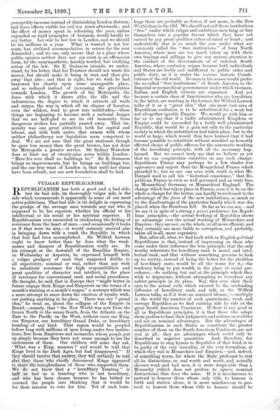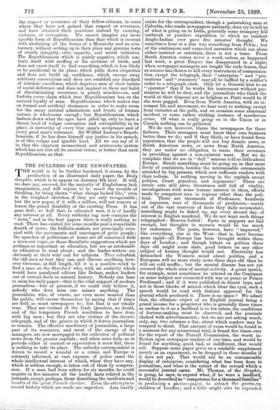VULGAR REPUBLICANISM.
REPUBLICANISM has both a good and a bad side, but its bad side, its thoroughly vulgar side, is the side which recommends it apparently to some of our most active politicians. That bad side is its delight in expressing the grudge of the average man towards any one who is supposed to be his superior, whether his official or his intellectual or his social or his spiritual superior. If Republicanism ever succeeded in eradicating the feeling of reverence from the heart of man,—and occasionally it looks as if that were its aim,—it would certainly succeed also in bringing down with a crash the Republic in which that feat had been accomplished. Sir Wilfrid Lawson ought to know better than he does what the weak- nesses and dangers of Republicanism really are. In his triumph at the downfall of the Brazilian Empire, on Wednesday at Aspatria, he expressed himself with a vulgar grudgery of rank that suggested dislike to all superiority, nominal or real, rather than any wish to substitute reverence for high responsibilities and great qualities of character and intellect, in the place of reverence for conventional rank and social precedence. He thought, he said, that in Europe they " might better in future engage their Kings and Emperors on the terms of a month's warning or a month's wages," a sentence which was a mere attempt to sneer down the emotion of loyalty with- out putting anything in its place. There was one " grand idea," he went on, about the collapse of the Empire in Brazil,—namely, that " the New World was now from the frozen North to the sunny South, from the Atlantic on the East to the Pacific on the West, without even one King, one Emperor, one hereditary Grand. Duke, or hereditary humbug of any kind. That region would. be peopled before long with millions of men living under free institu- tions, free from Emperors and monarchs, whom people put up simply because they have not sense enough to see the uselessness of them. Our children will some day ask, ' What was a King, mamma ?' and would. be told that Kings lived in the Dark Ages, but had disappeared.." If they shOuld receive that answer, they will certainly be told irlacijihat- those-Who chiefly. denounced Kings appeared.' torsha're the. benightedness of those, who supported. them. We do not know that a " hereditary humbug " is hPf.:.as bad as 'a humbug who' is not hereditary, and-who has been chosen because he has bribed or cozened the people into thinking that it would be for their interest to vote for him. Yet of such hum- bugs there are probably no fewer, if not more, in the New World than in the Old. We should not call those institutions " free" under which vulgar and ambitious men brag or buy themselves into a popular favour which they have not earned by any great qualities either of mind or heart; and undoubtedly that is as much the case under what are commonly called the " free institutions " of busy North America, where men are too much taken up with their own buyings and sellings to give any serious attention to the conduct of the Government, or of indolent South America, where confusion reigns because both individuals and States are feeble and indifferent to public order and public duty, as it is under the various historic Consti- tutions of the old world. No man in his senses would prefer the so-called " free institutions " of South America to the Imperial or monarchical governments under which German, Italian, and English citizens are organised. And yet because a certain class of functionaries who are hereditary in the latter, are wanting in the former, Sir Wilfrid Lawson talks of it as a " great idea" that one more vast area of Republican confusion is to be substituted for a weak but not altogether ignoble Empire. We would go with him so far as to say that if a badly administered Kingdom or Empire could be succeeded by a fairly well administered Republic, that would be a gain not only to the particular society in which the substitution had taken place, but to the world at large, which would thus have learned that it had become possible to substitute without mischief an honestly effected choice of public officers for the automatic working of the hereditary principle, with all its necessary hap- hazard. But we cannot truly say that we believe as yet that we can congratulate ourselves on any such change. Republican France may perhaps be a few shades less oppressive and unjust than the Monarchical France which preceded it ; but no one can aver with truth in what Mr. Disraeli used to call his " historical conscience," that Re- publican France is even as well governed and as truly free, as Monarchical Germany or Monarchical England. The change which has taken place in France, even if it be on the whole a change for the better, can hardly be reckoned to the advantage of the form of the new institutions, so much as to the disadvantage of the particular family which was dis- placed when the Bourbons fell. So far as we can see,—and we say it in spite of a strong a priori preference for Repub- lican principles,—the actual working of Republics shows no advantage over the actual working of Monarchies and Empires : they are not, on the whole, at all more efficient, and they certainly are more liable to corruption, and probably, taken all in all, more expensive.
But, after all, what we find fault with in English political Republicans is that, instead of impressing on those who come under their influence the true principle, that the only worthy substitute for hereditary rank is moral and intel- lectual rank, and that without something genuine to look up to, society, instead of being the better for the abolition of hereditary caste, would be all the worse for it, the tendency being to put wealth in the place of social pre- cedence,—do nothing but rail at the principle which they wish to depreciate, without attempting to introduce any nobler principle in its place. Nay, they even shut their eyes to the actual evils which succeed to the misleading influence of hereditary rank, and talk, as Sir Wilfiid Lawson talks, as if it were an unmixed blessing to multiply in the world the number of such quarrelsome, weak, and corrupt Republics as we find. existing side by side on the great South American Continent. If there is any good at all in Republican principles, it is that those who adopt them profess to base their judgments and actions on realities and not on nominal advantages. But the advantages of Republicanism in such States as constitute the greater number of those on the South American Continent, are not real at all ; they are advantages which could only be described in negative quantities. And, therefore, for Republicans to sing hymns to Republics of that kind, is to be guilty of the very unreality, of the very formalism, at which they rail in Monarchies and Empires,—and, indeed, of something worse, for where the State . professes to rest all its distinctions on real worth and merit, and 'actually chooses weak and bad men, it is more despicable than a Monarchy (which does not profess to ignore nominal distinctions) that does the same. If it is mischievous to pretend to honour those whose only title to honour is birth and station alone, it is more mischievous to pre- tend to honour those whose title to honour should be the respect or reverence of their fellow-citizens, in cases where they have not gained that respect or reverence, and have attained their positions instead by cunning, violence, or corruption. We cannot imagine any more ignoble form of Republicanism than that which is content with abolishing all the forms of a Monarchy and an aris- tocracy, without setting up in their place any genuine tests of sturdy integrity, civic capacity, and moral initiative. The Republicanism which is purely negative, which con- tents itself with scoffing at the accident of birth, and does not exert itself to find something which is less likely to be accidental in its place, which pulls down etiquettes and does not build up confidence, which sweeps away arbitrary conventions and does not establish any standard of intrinsic excellence, which deprives men of their habits of social deference and does not implant in them any habit of discriminating reverence, is purely mischievous, and forfeits every claim which true Republicanism has on the natural loyalty of man. Republicanism which makes war on formal and artificial obeisances in order to make room for the many natural admirations and trusts of human nature, is wholesome enough ; but Republicanism which batters down what the ages have piled up, only to leave a dreary level of vulgar corruption and corruptibility in its place, is unworthy of every wise man's acceptance and of every good man's tolerance. Sir Wilfrid Lawson's Repub- licanism, if he has done himself any justice in his speech, is of this vulgar and ignoble kind. All we can say of it is, that the emptiest monarchical and aristocratic system which has not lost all its ancient virtue, is better than such Republicanism as that.







































 Previous page
Previous page